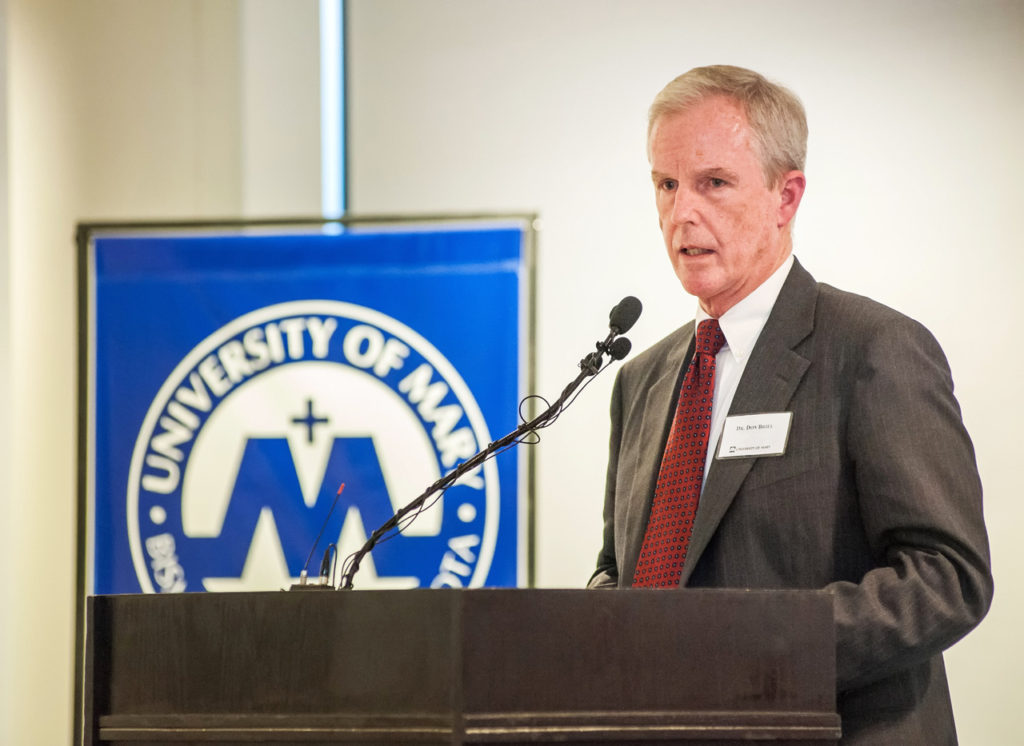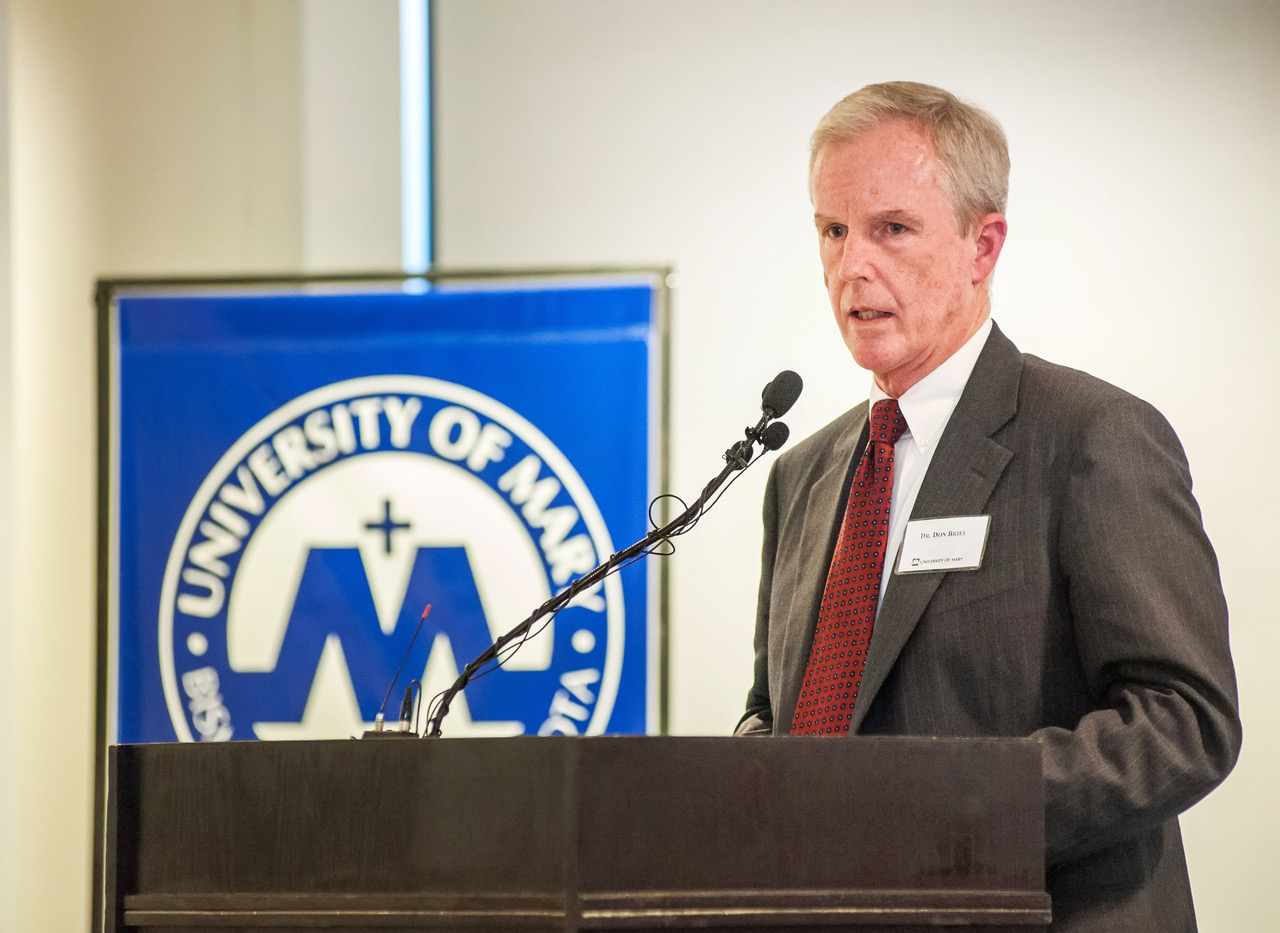
The University of Mary communities at its main campus in Bismarck, North Dakota and its satellite campus in Tempe, are among Catholic institutions mourning the loss of an instrumental figure: Dr. Don Briel.
He passed away Feb. 15 at the age of 71.
Don Briel
Born: Jan. 28, 1947
Died: Feb. 15, 2018
Contribution to Catholic education
- 1990-1999: Chair of theology department (first non-clergy) at University of St. Thomas in St. Paul, Minnesota
- 1993-2014: Founded of Center for Catholic Studies at University of St. Thomas in St. Paul, Minnesota
- 2014: Honorary doctorate from University of Mary conferred during “Twenty Years of Catholic Studies” conference, which was also referred to as the “Briel Conference”
- 2014-2018: Blessed John Henry Newman Chair of Liberal Arts at University of Mary in Bismarck, North Dakota
- 2017: Renewal of Catholic Higher Education: Essays on Catholic Studies published in honor of Don. J. Briel
Briel founded the largest Catholic Studies program in 1993 at University of St. Thomas in St. Paul, Minnesota where he was the longtime director and later brought it to University of Mary. He became Blessed John Henry Newman Chair of Liberal Arts at University of Mary in 2014, a role he held until his death.
The Catholic Studies program came to University of Mary – Tempe in 2012 where an average of 30 students each semester takes courses to round out their Arizona State University education or earn a dual degree from both universities. Some 250 students have passed through the Catholic Studies program in Arizona since its inception.
Briel’s vision of Catholic Higher Education helped guide the University of Mary’s partnership with Arizona State University — he assisted in guiding its strategy and growth. Briel also visited the Tempe campus and lectured there several times.
The Catholic Studies program was “to create a study of the Catholic faith that integrates all of their studies into a whole,” said Dr. Ryan Hanning, assistant vice president for strategic partnerships at University of Mary in Tempe.
The idea was to place a context on the faith in a lived reality, regardless of their academic pursuits. It’s what universities used to do, Hanning said.
The Catholic Studies program created an intellectual culture to form friendships and enter education with a deeper sense of how it impacted daily life.
“The fruits were remarkable in the life of the Church,” Hanning said.
Several of Briel’s students across the country became priests, including Bishop Andrew Cozzens, auxiliary bishop for the Archdiocese of St. Paul and Minneapolis, who concelebrated the funeral Mass alongside Msgr James Shea, president of University of Mary. At ASU alone, there have already been eight marriages among students in the Catholic Studies program, two babies, two discerning various forms of priesthood and two women discerning religious life.
Beyond that, Hanning said students studying for a semester under Briel at University of Mary’s Rome campus consistently say, “It’s there that the students enter the faith fully alive.”
A University of Mary press release prior to Briel’s death highlighted student testimonies. One called Briel’s teaching instrumental in her journey to join the Catholic Church. Another said Briel helped him understand “the incredible impact that Christianity has had on culture throughout history, and the crisis we face in turning away from it today.” That student, Peter Foley, is now a missionary with the Fellowship of Catholic University Students.
“I have been amazed at how much more fulfilling all aspects of life are when seen through the proper Catholic lens,” Foley said.
In a Feb. 8 interview with The Catholic Spirit, Briel discussed an array of things including the partnership of Catholic Studies with public institutions. He cited a “growing recognition” of the need to provide “for a more humanistic and purposeful vision of what education is for.” He named the Catholic Studies program through University of Mary’s affiliation in Tempe among them and expected that trend to grow.
Hanning agreed, noting that movements in the life of the Church come more fully alive following the lifetime of its founder.
“The ‘what next’ was very hope-filled,” Hanning said of the gatherings following Briel’s funeral.
Members of Handmaids of the Heart of Jesus, an order of sisters close to Dr. Briel, provided hospice care for Briel in his final month of life. He was diagnosed with two forms of acute leukemia in which chemotherapy could target one or the other, but not both.
Other tributes to Dr. Don Briel
First Things by George Weigel







